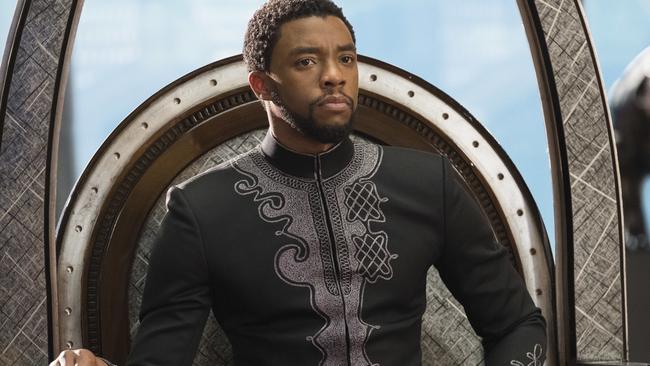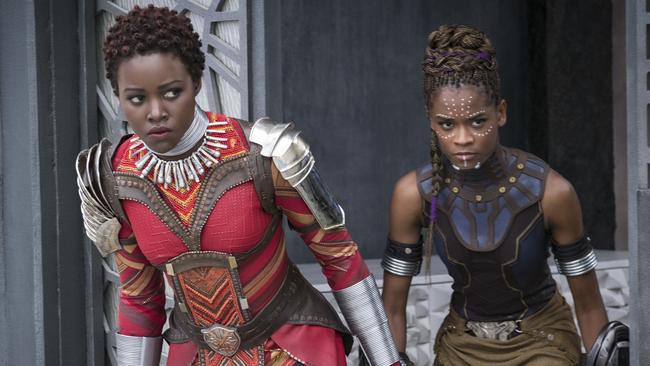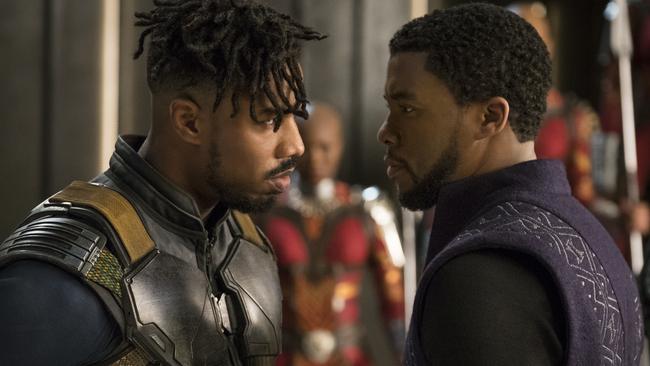Black Panther is unlike any other Marvel superhero movie
YOU know what to expect in a Marvel movie by now - but this one is different. Black Panther throws the usual rules out the window.
EIGHTEEN movies into the Marvel Cinematic Universe and you’re pretty familiar with the ground rules.
You should expect a two hours-plus runtime with four or five high-octane action sequences, smartarse quips and cheeky banter, speeches about heroism and sacrifice and a villain bent on some sort of ill-defined world-conquering quest.
What you don’t expect is a thoughtful story steeped in political parallels and the historical baggage of racial discrimination and suffering. That’s what makes Black Panther so unique among a teeming movie universe of extraordinary beings.
Written and directed by Ryan Coogler, the wunderkind filmmaker behind Creed and Fruitvale Station, Black Panther will go down as more than another instalment in the MCU.
That this movie, with this cast who look like they do, speaking the way they do, is breaking all kinds of early ticket sales records is significant, and a triumph. Like Wonder Woman before it, its success is another refutation in the narrative that big budget blockbusters need to feature primarily white male protagonists to be financially viable.

The character of Black Panther/T’Challa (Chadwick Boseman) was first introduced in Captain America: Civil War two years ago to wide acclaim and the action here picks up a week after the events in that movie which saw T’Challa’s father, King T’Chaka, killed by a bombing.
T’Challa hails from the fictional West African nation of Wakanda, a country that appears to be a third-world state to everyone else but is secretly the most technologically advanced civilisation on Earth thanks to its natural stores of vibranium.
T’Challa’s teen sister Shuri (Letitia Wright) is kind of like his Q, outfitting him with gadgets and tech that makes Tony Stark/Iron Man look like Billy Madison. In fact, all the female characters, including super spy Nakia (Lupita Nyong’o), warrior Okoye (Danai Gurira) and the Queen Mother Ramonda (Angela Bassett), are so compelling to watch, whether they’re throwing spears or throwing shade.
Wakanda has hidden its development from the world, afraid of tainting what makes it special and much of Black Panther is dedicated to this debate over isolationism or global engagement. It’s a timely plot point with American political rhetoric trumping protectionism and an inward-looking mentality.
Black Panther’s daring to be more than its genre conventions is a credit to it.

During the transition of power to T’Challa, Eric Killmonger (Michael B. Jordan) an assassin with a connection to Wakanda turns up with dangerous though appealing ideas, threatening a war that will spill well beyond its borders.
While Killmonger’s thirst for violent revolution is alarming, his experiences growing up in America as a black person inform him and his motivations. He’s more complex than your average comic book villain, even if the way he’s sometimes written doesn’t always gel.
Wakanda is vividly rendered by Coogler and his production designer Hannah Beachler, and lensed by his cinematographer Rachel Morrison. Coogler had worked with both women previously on Fruitvale Station and it’s a collaboration that clearly works.
The Wakanda you see on screen glimmers, an effortless blend of colourful African aesthetics and hi-tech utopia, and owes more than a touch to legendary comic artist Jack Kirby. Every character that inhabits this world, which vary from the plains of the border tribes to the snowy gorges of the mountain clan, undeniably belongs to it. That Coogler is able to evoke such a strong sense of place is a testament to the combined talents of the team.
There are missteps along the way — the pacing is inconsistent with long sequences that stretch on needlessly and the dialogue sometimes veers towards clunky.

Black Panther can’t hope to represent the experience of all black people around the world — it’s not an all-encompassing pan-African representation of it or its diaspora. But it makes bold declarations about representation on film and how blockbusters can literally look. What we see reflected back at us matters, and it matters to kids who pay for a ticket to watch superheroes battle it out on screen.
While Australians with sub-Saharan African heritage is small compared to other backgrounds, Black Panther is a reminder for all that the monopoly is ending.
Also, it’s still a fun, fresh superhero movie with some really kinetic action sequences.
Rating: 3.5/5
Black Panther is in cinemas from Thursday, February 15.
Share your movies and TV obsessions with @wenleima on Twitter.



